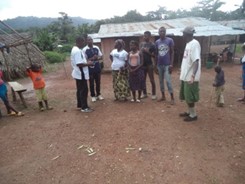This project is made possible through the partnership of WATER CHARITY and the NATIONAL PEACE CORPS ASSOCIATION. ![]()
The project is being implemented in association with Women’s Campaign International.
Location
Gokai, Bong County, Liberia
Community Description
Gokai is located in Suakoko District in the north of Bong County. The community is accessible by road and largely depends on farming for its economy. The community does not have a health clinic or any medical personnel, but there is a privately-run drug store.
Gokai was severely affected by the recent Liberian Civil War and Ebola epidemic, during which 12 people in the community died. The village is divided into four distinct quarters, and the total population is approximately 1,800 people.

Problem Addressed
Gokai was identified and selected for its high level of need. While there is currently a hand pump in the upper part of the community, it is not accessible to the entire population. There is also no public latrine and many in the community do not have their own latrines, forcing them to defecate in the area surrounding the village
Project Description
This project is to install a hand pump well, and a public latrine.
The hand pump well will be located at the center of the village by the town hall, underneath a coconut tree. This location was chosen in consultation with village leaders because it is the area of the highest population in the community and an area with better sanitation than the rest of the town. This will allow the majority of the community to use them well without traveling a great distance.
The depth of the well is estimated to be at least 40 feet. The Afridev hand pump will be utilized. It is widely used throughout Liberia and is a relatively simple pump, which means that repair parts will be purchased without a problem and that it will be easily maintained.
The hand pump well will be fitted with a locking mechanism that will be controlled by the water committee. This will allow the community to control when the well will be in operation, preventing water from being wasted.
The building for the latrine will be located on the edge of town. It will have a 2’ foundation beneath the surface and will sit 1’1” above the ground to prevent flooding during the rainy season. There will be breeze/honeycomb blocks on either side of the building to allow for increased ventilation and light. The building will be separated down the middle by a wall to separate the men’s and women’s sides.
On each side will be located in a sink area with a bucket for washing. Adjacent to this will be two toilet stalls and then a bathing stall. Each will have locking doors. The toilets will be squat toilets that will use water to flush the waste down to the septic tank. All water for flushing toilets, the bathing area, and the sink will be carried in buckets from the hand pump well. A three-chamber septic tank will also be constructed.
Community education training on sanitation will be conducted by an experienced contract educator, Vision Collaborator. Before any construction begins, Vision Collaborator will hold training sessions with the identified laborers in the community. This will ensure that laborers hired for the project have the knowledge and skills needed to maintain the hand pump well and latrine once the projects are complete.
 Project Impact
Project Impact
1,800 people who live in the community, consisting of 800 women, 600 children, 325 men, and 75 elderly, will benefit from the project.
Project Administration
This project is being implemented under the direction of Returned Peace Corps Volunteer Graham Button, who serves as Program Manager at Women’s Campaign International.
Monitoring and Maintenance
Key community leaders have been engaged in the project and will be involved in supporting community buy-in to the project. They have identified key community members who will serve on a water committee and will be responsible for the long-term upkeep and maintenance of the well and latrine.
Comments
The hand pump well will give the entire community a place in the center of the village to get clean water for drinking, washing, cooking, and bathing. It will improve the health of the community and reduce the burden that falls on women and youth to retrieve water.
The latrine complex will give members of the community a safe place to use the bathroom and wash, thus improving the health and hygiene of the community.
This project is part of our Western Africa Water & Sanitation Program.
This project has been fully funded by an anonymous donor.
This project has been completed. To read about the conclusion, CLICK HERE.